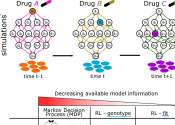Research team reports new class of antibiotics active against a wide range of bacteria
Wistar Institute scientists have discovered a new class of compounds that uniquely combine direct antibiotic killing of pan drug-resistant bacterial pathogens with a simultaneous rapid immune response for combatting antimicrobial ...
Dec 23, 2020
0
434








